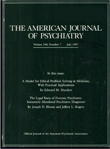Predicting academic performance of medical students: the first three years
Abstract
OBJECTIVE: The purpose of this exploratory study was to identify a cluster of variables that would most economically explain variations in the grade point averages of medical students during the first 3 years of study. METHOD: Data were derived from a study of 92 students admitted to the 3rd Faculty of Medicine in 1992-1993 academic year and who were still in the medical school at the end of the sixth semester (third year). Stepwise regression analysis was used to build models for predicting log-transformed changes in grade point average after six semesters of study-at the end of the first, second, and third years. Predictor variables were chosen from four domains: 1) high school grade point averages in physics, mathematics, and the Czech language over 4 years of study, 2) results of admission tests in biology, chemistry, and physics, 3) admission committee's assessment of the applicant's ability to reproduce a text, motivation to study medicine, and social maturity, and 4) scores on the sentimentality and attachment scales of the Tridimensional Personality Questionnaire. RESULTS: The regression model, which included performance in high school physics, results of the admission test in physics, assessment of the applicant's motivation to study medicine, and attachment scale score, accounted for 32% of the change in grade point average over six semesters of study. The regression models using the first-, second-, and third-year grade point averages as the dependent variables showed slightly decreasing amounts of explained variance toward the end of the third year of study and within domains, changing the structure of predictor variables. CONCLUSIONS: The results suggest that variables chosen from the assessment domains of high school performance, written entrance examination, admission interview, and personality traits may be significant predictors of academic success during the first 3 years of medical study.



